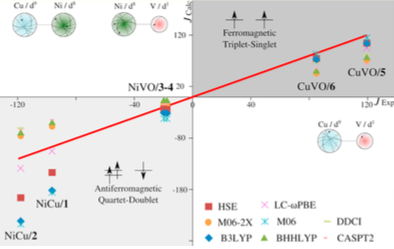Spin Adapted Versus Broken Symmetry Approaches in the Description of Magnetic Coupling in Heterodinuclear Complexes
Spin Adapted Versus Broken Symmetry Approaches in the Description of Magnetic Coupling in Heterodinuclear Complexes
R. Costa, R. Valero, D. Reta-Mañeru, I. de P.R. Moreira, F. Illas.
J. Chem. Theo. Comput. 11 (2015) 1006.

We have studied the performance of a series of multi-reference wave function and density functional theory based methods in predicting the magnetic coupling constants of heterodinuclear magnetic complexes. When using MR-WF methods the performance is found to be similar to other simple cases involving homodinuclear Cu(II) complexes, being the accuracy limited by the amount of dynamical correlation accounted for. When using DFT based methods, the usual broken symmetry approach provides a convenient framework to predict the magnetic coupling constants, although spin projection based techniques cannot recover the corresponding spin adapted solution. We have shown that a mapping procedure using the expectation values of the Heisenberg Hamiltonian in combination with a careful selection of the appropriate broken symmetry determinants provides a consistent relationship to derive J values from the BS solutions. Our trials using spin flip techniques lead to unphysical outcomes.
